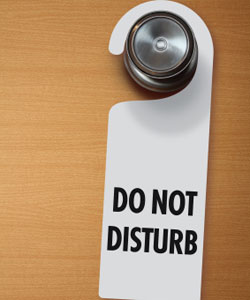How much time during your business day are you truly concentrating on your work? During the day, the average person is interrupted once every 11 minutes. It’s been estimated that it takes the human mind approximately 25 minutes to get up to speed on anything.

Last week when I presented this information at a private Rockefeller Habits Workshop to one of my clients, the operations manager for this company decided to take action. His company is a landscape architectural firm where concentration and focus is extremely important. His staff needs to have longer periods of attentiveness to the task of creating gardens and landscape features for their clients. They are one of the most respected landscaping company’s in the country, specializing in private gardens for an elite group of well known and wealthy clientel, so their work requires absolute dedication to ensure their reputation is maintained.
Andres, the operations manager realized that under present circumstances his staff was probably being interrupted too frequently either by phone calls or by self-distraction. Too often all of us are guilty of distracting ourselves and one of the places that provides temptation is our emails. Andres initiated a brilliant policy that prohibits phone calls from interrupting his staff at certain times during the work day, and installed a policy that his staff will only check emails and return phone calls during designated times.
This may appear to be restrictive for many office environments, and perhaps it would be for your specific business. You need to recognize the ebb and flow of your business and determine what behavior and actions can and should be restricted and which can be permitted. Years ago smoking on the job was considered permissible, yet over time the conclusion of research and studies indicated that smokers lost concentration and worse yet the damage of smoke to nonsmokers inhibited their performance and health.
If your people need to concentrate for extended periods of time to produce at a high level perhaps it’s time you look at establishing policies that will make your people more productive. Remember too that people need rest and recovery to perform at a high level. Just as we need extended periods of time for concentration, after about 90 minutes to two hours we need to get up, move around and recover. “The energy you have within you is finite and must be managed properly to perform at your best. If you don’t learn how to effectively manage your energy, you struggle to focus, be creative, solve problems readily, be patient, and the list goes on.” This information is provided by the Human Performance Institute, the authors of The Power of Full Engagement and Stress for Success.
They continued, “For maximum effectiveness and greater productivity, live your life as a sprinter, not a marathoner. Sprinters explode with short bursts of energy toward a foreseeable finish line. Marathoners race off towards an invisible destination while desperately trying to manage a constantly declining reservoir of energy.
Energy renewal occurs during moments of rest or recovery. Try this recovery strategy: Break your work day up into manageable sprints, about 90 to 120 minutes in length, followed by periods of strategic recovery (such as going for a brisk walk) for about 10 to 15 minutes. This will result in increased energy levels, higher productivity, and a greater sense of accomplishment. Extraordinary performance occurs in the sprints.”
Many of us attack our jobs and projects ferociously, believing if we can sustain our attention long enough we will complete the job no matter the cost in time and energy. If you look at any task as a series of sprints, with periods for rest and recovery in between you will discover you complete the job faster, more effectively and best of all more satisfyingly.
Take a look at your work, and the work of your people. Are you recognizing these patterns for need for concentration, decreased interruptions and periodic rest and recovery times? If not perhaps a study on your company’s work habits could result in a significant increase in productivity. Wouldn’t that be an important area for you to concentrate on?






.jpeg?width=150&height=135&name=Hand%20with%20marker%20writing%20the%20question%20Whats%20Next_%20(1).jpeg)

